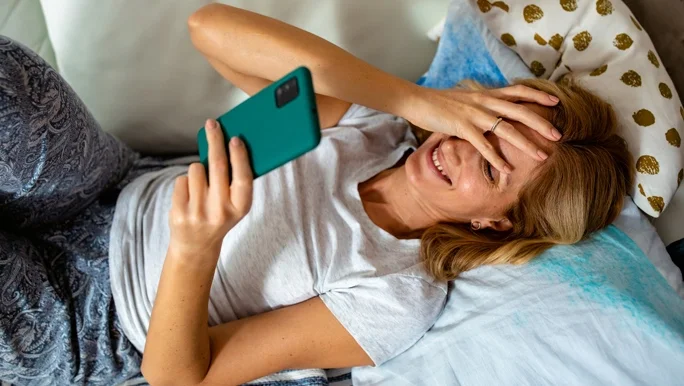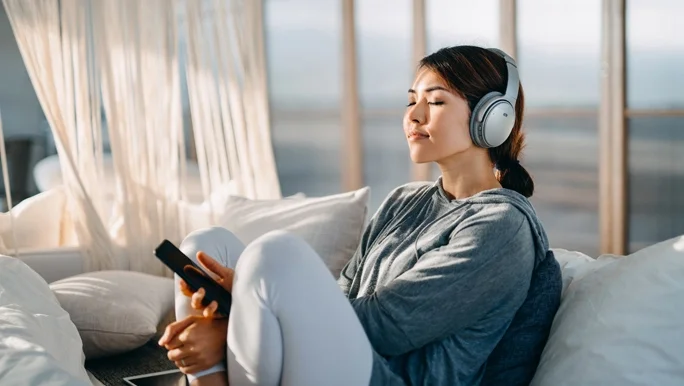What does revenge sleep procrastination mean?

Key Points
- Sleep is vital for optimum health
- Some people make the choice to forgo sleep in order to have more personal time
- Rest time and sleep should be prioritised just like any other meeting or appointment
Bedtime procrastination is nothing new. Tiny humans have long perfected the art of not going to bed. Endless questions, ravaging hunger and a desperate need for a pee, timed perfectly for the moment their parents are about to say ‘bedtime!’.
As adults, many of us still put off going to sleep at an appropriate time. Despite knowing the importance of sleep, we still want to finish a task, watch a TV show or read more of a good book.
You know it would be good to go to sleep, which is the revenge bit, but instead you choose to do something else.
But the notion of revenge sleep procrastination has taken off in social media circles, making it about more than just going to bed late.
Sleep Specialist Dr David Cunnington is here to help us understand the ins and outs of this night-time procrastination situation.
What is sleep procrastination?
Sometimes, a late night is unavoidable. An unexpected deadline at work or a sick child might mean that going to bed later than you would normally.
Sleep procrastination is when you specifically delay going to bed. You know it’ll reduce the amount of sleep you’ll get and you know how you’ll feel in the morning, but you still don’t go.
Dr David tells us that there can be specific reasons why people don’t want to go to bed.
Issues such as insomnia can mean that bedtime is viewed as a negative experience.
“It's unpleasant going to bed and not being able to sleep, so we avoid the unpleasant things,” explains Dr David.
Sleep can even be traumatic for some people who may experience flashbacks to past traumas or other distressing dreams.
“In my clinical practice, people will tell me “I’m tired but I don’t want to sleep.” They're literally fearful of going to sleep,” says Dr David.
If you feel you’re experiencing these kinds of sleep issues, we recommend you talk to your health professional and find the right support for you. You don’t need to deal with it alone.

Delaying sleep is one way to get some ‘extra’ time, getting ‘revenge’ on your day that left you no time for any personal activities.
How does not wanting to go to sleep include revenge?
As there are only a certain amount of hours in a day, it can be easy to feel resentful when very few of those hours are spent doing stuff for yourself.
When the majority of your day is taken up by either long working hours or looking after children, it’s understandable that some people look for ways to claw back some time that’s just about them.
Delaying sleep is one way to get some ‘extra’ time. It’s as if you are getting ‘revenge’ on your day that left you no time for any personal activities, or ‘me time’.

Do you need to track your sleep?
With smart gadgets the norm these days you can track just about anything, including your sleep. But do you need to? And do sleep trackers actually work? Let's find out.
“You know it would be good to go to sleep, which is the revenge bit, but instead you choose to do something else.” clarifies Dr David.
As it’s a fairly new phenomenon, it doesn’t have a specific medical definition.
“It's more like an urban dictionary term rather than a tightly defined term,” says Dr David.
It’s not entirely clear where it was first used, but this particular tweet went viral because the idea of bedtime revenge procrastination struck a chord with many people.
Why would someone procrastinate going to bed?
Despite knowing how to get better sleep and what less sleep will mean for them the next day, some of us are still willingly put off going to bed. But why?
Reasons can be different for everyone.
- For a stay-at-home-parent, those late night hours may be the only peace you get all day.
- For someone one who works long office hours, it could be the only way to have some time to relax.
- There are studies showing it can depend on your chronotype; whether you are a night owl or an early bird.
Dr David also says he sees it with people with issues with impulse control. Self-regulation tends to be at its lowest in the evenings. Add in poor impulse control and a desire for more personal time, bedtime revenge procrastination becomes the end result.

Consider your downtime as important as any other meeting or appointment so schedule it into your day. And stick to it!
Revenge may be sweet, but lack of sleep is not
Have you noticed how some people can be more moody and grumpy when they haven’t had a good night’s sleep? This is because emotional regulation and many other health issues are linked to sleep.
Not getting enough sleep can cause issues with
- hormone imbalances
- unhealthy eating habits
- immune system functionality
There are even studies that suggest too little sleep can increase your risk of death.
Surely that’s a good enough reason to get some shut-eye at a reasonable hour!
Making time for yourself is good for your mental health. But sacrificing sleep in order to get that time isn’t a healthy trade off. Once you understand what happens when your circadian rhythm is disrupted (your internal wake/sleep cycle), you can begin to understand why a good night's sleep is so important.
How to curb the habit
So what can you do to improve your sleep habits yet still have some much-needed personal time?
“If you fill too much of the day with task-orientated activities, you won’t be leaving enough time for rest, recovery, sleep,” says Dr David. “Build in rest and recovery time into your day, but not by reducing the sleep time.”
If our sleep hacks aren’t enough to help you put revenge to bed, we’ve got some other suggestions that may help.
Plan your ‘me time’
Consider your downtime as important as any other meeting or appointment so schedule it into your day. And stick to it!
Don’t let it be put off until the end of the day when you feel as if you have no choice but to go to bed later so you can have that time.
Create a nighttime ritual that’s hard to ignore
Make going to bed at night something you look forward to. Take an assessment of your sleep hygiene and see what you can improve (it’s about more than just clean sheets BTW).
If you're not sure where to start, try this 5-minute meditation from the 'Get more sleep' program, that's perfect to get you ready for sleep.
Put the devices to bed elsewhere
Blue light from screens can affect your sleep. So when you go to bed, leave the phone alone.
Address other health issues
Maybe you need some help with snoring for either you or your partner. Or menopause could be causing sleep issues in your bedroom.
Having a chat with your health professional about any health issues could help make sleeping a more pleasurable pastime.
Living well is the best revenge
If you take ‘revenge’ on your busy life by depriving yourself of a basic human need such as sleep, the main person who will suffer will be you.
You shouldn’t have to choose between having personal time and having sleep time. So assess what you spend your day doing and prioritise. Just make sure you are one of your top priorities.
Reviewed by the healthylife Advisory Board March 2022